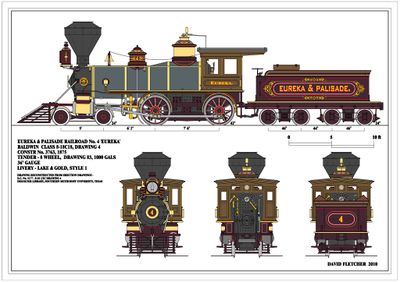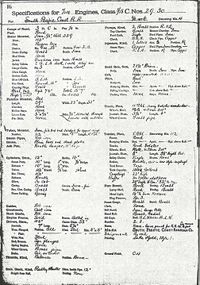Difference between revisions of "BLW-CN3971-1876"
From PacificNG
| Line 1: | Line 1: | ||
==History== | |||
Built by the Baldwin Locomotive Works in 1876 for the [[South Pacific Coast Railroad]] of California. | |||
<span style="float:right;">__TOC__</span> | <span style="float:right;">__TOC__</span> | ||
[[File:Davidf-Fletcher Eureka and Palisade Eureka Drawing.jpg|400px|left|thumb|When it was built South Pacific Coast #3 was delivered in the standard Baldwin paint scheme of the time]] | [[File:Davidf-Fletcher Eureka and Palisade Eureka Drawing.jpg|400px|left|thumb|When it was built South Pacific Coast #3 was delivered in the standard Baldwin paint scheme of the time]] | ||
| Line 50: | Line 63: | ||
|} | |} | ||
==Service== | |||
====South Pacific Coast==== | ====South Pacific Coast==== | ||
Revision as of 10:14, 3 October 2020
History
Built by the Baldwin Locomotive Works in 1876 for the South Pacific Coast Railroad of California.
Specifications
| Baldwin Class | 8-18C 30, Drawing 4. |
| Whyte | 4-4-0 |
| UIC | 2′B n |
| Gauge | 3 ft (914 mm) |
| Driver Dia. | 42 in (1,067 mm) |
| Loco weight | 22 short tons (20.0 t) |
| Fuel Type | Wood |
| Boiler Pressure | 120 psi (0.83 MPa) |
| Cylinders | Two, outside |
| Cylinder Size | 12 in × 16 in (300 mm × 410 mm) |
Service
South Pacific Coast
Ordered by the South Pacific Coast Railroad in June 1876.
Colusa & Lake
Sold to the Colusa & Lake Railroad in 1906
United Commercial
After the Colusa & Lake was scrapped the locomotive remained at the United Commercial Company yard. An advertisement mentioned the locomotive and several freight cars were for sale.
United States Gypsum
Locomotive #4 and several flat cars were finally sold to the United States Gypsum Company and used in the construction of their railroad from Plaster City to the category:gypsum deposits to the north west. The locomotive was replaced by larger equipment after the line was completed and eventually scrapped.




